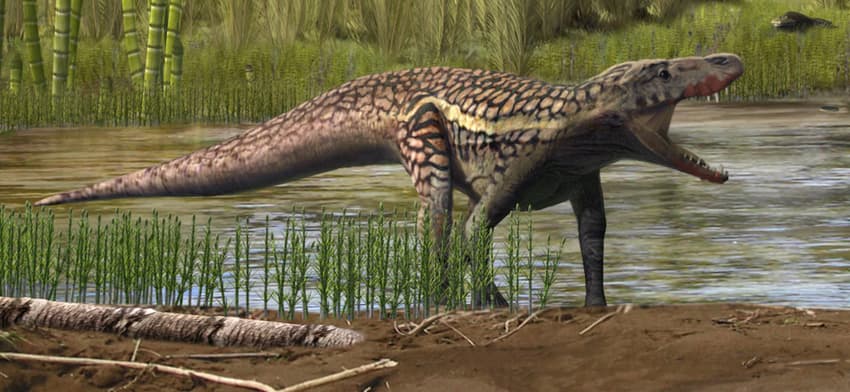This ancient reptile patrolled the river beds of the Spanish Pyrenees, scientists believe

Scientists have discovered a fossilised footprint from about 247 to 248 million years ago in the Pyrenees mountains in Spain which they believe was made by a previously unknown species of reptile.
The footprint was found among a series of tracks made by the ancestors of crocodiles and dinosaurs, a group known as archosauromorphs, the researchers from the Autonomous University of Barcelona and the Catalan Institute of Palaeontology said in a statement.
The scientists dubbed the new species of reptile Prorotodactylus mesaxonichnus in an article published in scientific journal Plos One.
They believe the species looked like a crocodile but with wider legs and was about a metre-and-a-half (five feet) long.
The researchers said the footprints suggest the tracks which they found in the Pyrenees mountains in northeastern Spain on the border with France were made by animals that used all four limbs to walk and often also left marks with their tails.
"The new Pyrenean footprints indicate that these animals used all four limbs to walk and often also left marks with their tails," said Catalan Institute of Palaeontology researcher Josep Fortuny.
The researchers believe the archosauromorphs dominated the river beds of the ancient Pyrenees. They said they are now looking for fossilised bones of the animals that made the tracks.
At the time, the Earth was very different from today, with continents grouped into one supercontinent called Pangaea and the planet was recovering from a mass extinction that wiped out most animals.
About 252 million years ago, a mass extinction devastated life on land and in the oceans. Some 90 per cent of species disappeared.
READ ALSO: 125 million-year-old dinosaur with hump discovered in northern Spain
Comments
See Also
The footprint was found among a series of tracks made by the ancestors of crocodiles and dinosaurs, a group known as archosauromorphs, the researchers from the Autonomous University of Barcelona and the Catalan Institute of Palaeontology said in a statement.
The scientists dubbed the new species of reptile Prorotodactylus mesaxonichnus in an article published in scientific journal Plos One.
They believe the species looked like a crocodile but with wider legs and was about a metre-and-a-half (five feet) long.
The researchers said the footprints suggest the tracks which they found in the Pyrenees mountains in northeastern Spain on the border with France were made by animals that used all four limbs to walk and often also left marks with their tails.
"The new Pyrenean footprints indicate that these animals used all four limbs to walk and often also left marks with their tails," said Catalan Institute of Palaeontology researcher Josep Fortuny.
The researchers believe the archosauromorphs dominated the river beds of the ancient Pyrenees. They said they are now looking for fossilised bones of the animals that made the tracks.
At the time, the Earth was very different from today, with continents grouped into one supercontinent called Pangaea and the planet was recovering from a mass extinction that wiped out most animals.
About 252 million years ago, a mass extinction devastated life on land and in the oceans. Some 90 per cent of species disappeared.
READ ALSO: 125 million-year-old dinosaur with hump discovered in northern Spain

Join the conversation in our comments section below. Share your own views and experience and if you have a question or suggestion for our journalists then email us at [email protected].
Please keep comments civil, constructive and on topic – and make sure to read our terms of use before getting involved.
Please log in here to leave a comment.